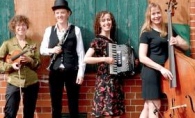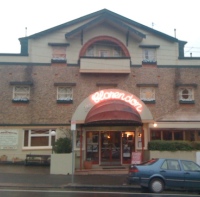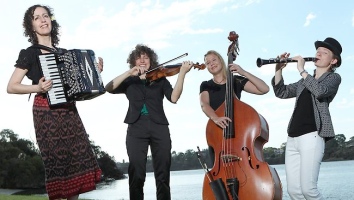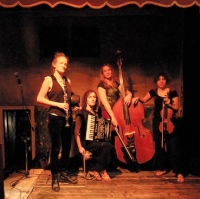- About Us
- Columns
- Letters
- Cartoons
- The Udder Limits
- Archives
- Ezy Reading Archive
- 2024 Cud Archives
- 2023 Cud Archives
- 2022 Cud Archives
- 2021 Cud Archives
- 2020 Cud Archives
- 2015-2019
- 2010-2014
- 2004-2009
 |
The London Klezmer Quartet |
Klezmer music is probably a mystery to most Australians. It arises in the experience of European Jews and initially expresses their unique religious and cultural concerns. When you hear the London Klezmer Quartet however, any social distinctions simply disappear. When they play, their individual virtuosity and superb sense of ensemble make the music immediately accessible and easy to appreciate.
I have had the privilege of attending several LKQ performances, most recently at the Clarendon in Katoomba. There I sat so close to the stage that I felt part of the action – the little nuances of communication between the players became like personal signals to me. Sometimes these were pre-arranged nods telling other players that a flourish on clarinet or fiddle was about to end but sometimes they were spontaneous smiles or twinkles of the eye that referred to previous performances of particular numbers. They might as well have said ‘We did that better today’ or ‘I always like that bit’.
On their Australian tours, Ilana Cravitz (violin), Susi Evans (clarinet) and Carol Isaacs (piano accordion) pick up Indra Buraczewska on bass. They joked that they met Indra online at www.lonelyklezmerbassplayer.com and that she auditioned on Skype, but however they got together, it was very fortuitous indeed. Indra pointed out that as a Melbourne girl she spoke Yiddish with a Yarrah accent. Her interactions with the other players were well timed, enthusiastic and happy. Indra also added a couple of songs to the performance – one about the ubiquity of the potato and another – Go Down, Moses! – which she attributed to the well known Klezmer trumpeter Louis Armstein. Her powerful voice would not be lost in the noisiest cabaret. A new CD – a third for the band after LKQ and Welcome to Butterfield Green N16 - is imminent and will include Indra’s recent contributions.
Indra also added a couple of songs to the performance – one about the ubiquity of the potato and another – Go Down, Moses! – which she attributed to the well known Klezmer trumpeter Louis Armstein. Her powerful voice would not be lost in the noisiest cabaret. A new CD – a third for the band after LKQ and Welcome to Butterfield Green N16 - is imminent and will include Indra’s recent contributions.
Some of LKQ’s tunes come from the Synagogue. Some are carousing songs. Some are laments about the experiences of Jewish people during other people’s wars down the centuries. Others are compositions by famous British, American and East European klezmer players. Sometimes, LKQ have broadened their repertoire following collaborations with other klezmer players or musicians from tangentially related genres, especially from the Balkans. Among the best of these recent additions to the klezmer repertoire are pieces created by members of LKQ themselves. As with all great ensembles, LKQ stretch the boundaries of the genre by incorporating sounds from other traditions and sometimes from cultures alien to older klezmer players. In one piece composed during a holiday in Thailand for example, the ‘Santipap Hora’, Caroline produces flourishes on the accordion that echo the warbling notes of the Thai instrument, the khaen.
This is truly world music in more ways than one. Artists paying homage to our national song ‘Waltzing Matilda’ produce some amazing sounds. Many Australians have heard Buchu doing a version of ‘Waltzing Matilda’ straight from Mongolia with throat singing, nose whistle and the horse-head fiddle. In honour of their Australian friends, LKQ do a number called ‘Billabong Bulgar’.
In comparison with Australian traditional dance music, klezmer is much less rigid in form. The Hora dances reflect this fluidity and as might be expected, so does the musical accompaniment. At a ‘klezmer ceilidh’ LKQ have been known to play for close to an hour for a single dance. There is great use of contrast between light and dark phrases, slow and fast movements and wide variations in volume. A syllable in a song is more likely to be stretched over several notes up and down the scale. The instruments engage in call and response rather like a canon or round or perhaps an impromptu break in a jazz concert.
At a ‘klezmer ceilidh’ LKQ have been known to play for close to an hour for a single dance. There is great use of contrast between light and dark phrases, slow and fast movements and wide variations in volume. A syllable in a song is more likely to be stretched over several notes up and down the scale. The instruments engage in call and response rather like a canon or round or perhaps an impromptu break in a jazz concert.
When LKQ are on stage the players become one with the music. They are absorbed into their instruments and it does not seem to matter where the human and the machine meet. The players frequently feel the passion in a piece and close their eyes to concentrate on the sound. When the band members are moved in such a profound way, so too is the audience. It seems clear that the London Klezmer Quartet is very fond of playing in Australia. The sustained applause at their concerts suggests that the fondness is reciprocated. Already, fans will be hoping they tour again in early 2015.
A former academic, Tony Smith has written extensively on a wide range of subjects as diverse as folk music and foreign policy issues in the Australian Review of Public Affairs, the Journal of Australian Studies Review of Books, Overland, the Australian Quarterly, Eureka Street, Online Opinion and Unleashed.
